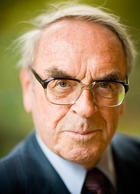
Born in 1926, he is one of the great contemporary theologians. After teaching at the universities of Wuppertal and Bonn, he was Professor of Systematic Theology at the University of Tübingen between 1967 and 1994. After the first influence of Karl Barth, his theological work will be echoed by his Göttingen professors (among others, Gerhard von Rad and Ernst Käsemann). It will also be relevant for him the contact with Jewish thought, through Ernst Bloch -who introduces him into Marxism, from where he will come to be linked to pacifist and green movements-, Franz Rosenzweig and Abraham Heschel. He has also been one of the first theologians to study the ethics of Dietrich Bonhoeffer. His work Theology of Hope (1964) soon gave him an understanding beyond the German language and marks the moment when theology begins to become political, "freeing Christians from doubt and mobilizing non-Christians to the hope". Among his many works translated into Castilian also include: The crucified God (1972), The future of creation (1977), Trinity and Kingdom of God (1980), God in creation (1985), The coming of God (1995). ) or Christ for us today (1994), published in this same Editorial.








